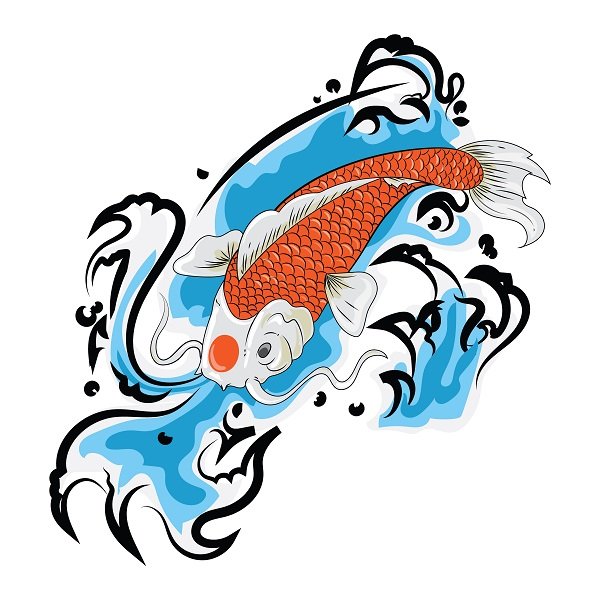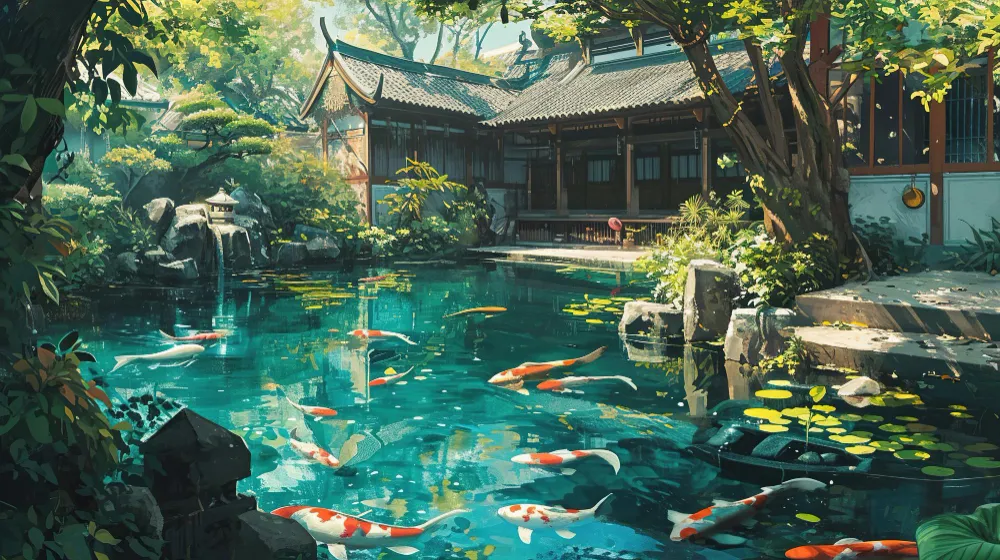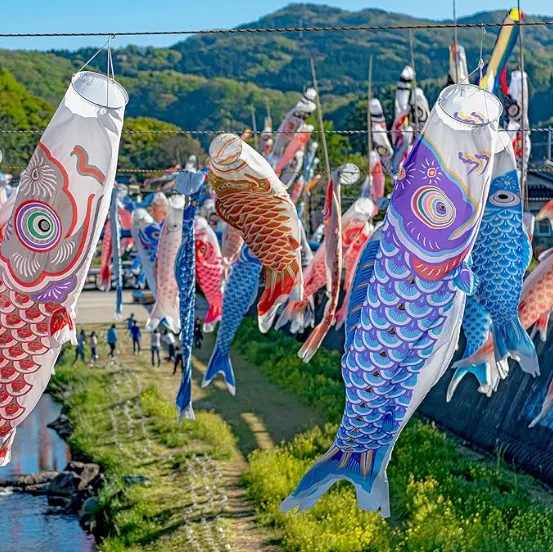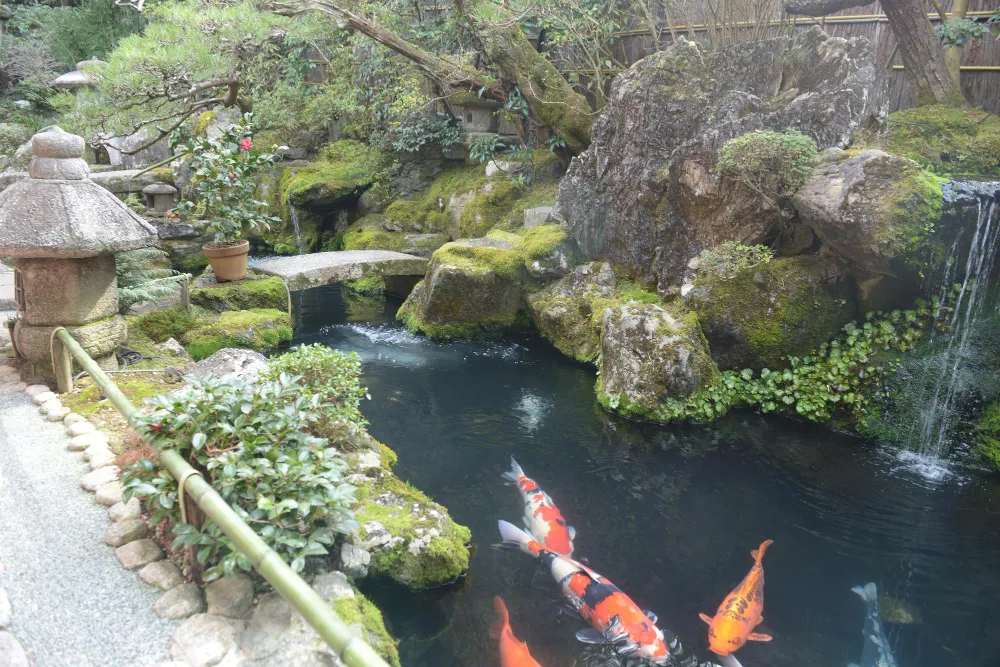
Introduction to Koi Fish Mythology
Koi Fish Mythology, Koi fish, with their brilliant colors and serene presence, have been mesmerizing humanity for centuries. Beyond their visual appeal, these aquatic marvels are steeped in deep symbolism and mythology, particularly in Asian cultures. From Japanese traditions to Chinese legends, koi fish embody qualities like perseverance, transformation, and prosperity, making them timeless symbols of resilience and harmony.
Their journey, from humble carp to celebrated legends, is filled with tales of determination and spiritual significance. In this exploration, we’ll uncover their historical origins, legendary stories, cultural symbolism, and lasting influence in art, literature, and modern culture.

The Origins of Koi Fish: From Humble Carp to Legends Koi Fish Mythology
Koi fish trace their roots back over 2,000 years to ancient China, where they were originally bred as resilient and adaptable carp. These fish thrived in tough conditions, earning a reputation for endurance. Over time, selective breeding transformed these unassuming carp into the vibrant koi we admire today, adorned with dazzling colors and unique patterns.
When koi fish were introduced to Japan, they became living works of art. Japanese breeders developed exquisite varieties like Kohaku (red and white), Showa (black, red, and white), and Ogon (metallic gold). Alongside their beauty, koi fish began symbolizing life’s struggles and triumphs, deeply embedding themselves in cultural lore.
Koi Fish in Japanese Mythology
The Dragon Gate Legend
In Japanese mythology, one of the most celebrated tales is the koi fish’s journey to the Dragon Gate. Legend has it that a school of koi swam against the strong currents of the Yellow River, facing countless obstacles. Only the most determined koi reached the waterfall known as the Dragon Gate. As a reward for their perseverance, the gods transformed them into majestic dragons.
This story embodies resilience and success through effort, encouraging people to overcome adversity in pursuit of greatness.

Celebrations and Cultural Significance
Koi fish hold a special place in Japanese celebrations like Children’s Day (Kodomo no Hi), where families fly carp-shaped windsocks called koinobori. These streamers represent family members, with the largest symbolizing the father, followed by the mother and children.
In art and literature, koi are often portrayed swimming against currents, symbolizing strength, courage, and transformation.
Koi Fish in Chinese Mythology
In Chinese traditions, koi fish are symbols of prosperity, ambition, and success. Their mythology mirrors Japan’s Dragon Gate legend, with similar themes of transformation and perseverance.
The Dragon Gate Legend in China
The Chinese version of the Dragon Gate legend highlights the koi’s relentless journey upstream. Those that ascend the Dragon Gate transform into dragons, a metaphor for achieving greatness through determination and hard work.
Wealth and Harmony
In Chinese art and Feng Shui, koi fish are seen as harbingers of wealth and balance. Gold and red koi are particularly auspicious, symbolizing joy, prosperity, and good fortune. Ponds featuring koi are believed to attract positive energy (chi), creating harmony in homes and gardens.
Koi Fish and the Yin-Yang Philosophy
Koi fish are also associated with the Taoist concept of Yin and Yang, representing balance and duality. Their contrasting colors—such as black and white or gold and silver—symbolize harmony between opposing forces.
In Feng Shui, koi fish swimming in circular ponds mirror the flow of Yin and Yang energies, fostering peace and prosperity.
Koi Fish in Art, Literature, and Tattoos
Artistic Depictions
Koi fish have long inspired artists, appearing in traditional Japanese woodblock prints and Chinese scroll paintings. Their dynamic movements and vibrant colors make them popular subjects in classical and modern art.
Tattoos and Personal Symbolism
Koi fish tattoos carry profound meanings, often tied to color and direction:
- Gold Koi: Wealth and success.
- Red Koi: Passion, love, and strength.
- Black Koi: Overcoming adversity and transformation.
- Upstream Swimming: Perseverance and ambition.
- Downstream Swimming: Achievement and contentment.
These tattoos narrate personal journeys, triumphs, and life’s struggles.
Modern Cultural Significance
From tranquil koi ponds to vibrant tattoo designs, koi fish continue to symbolize resilience, balance, and beauty in today’s world.
Popular Media
In literature, films, and video games, koi fish frequently symbolize transformation and perseverance, bridging ancient mythology with modern storytelling.

Home and Garden Aesthetics
Koi ponds remain staples of garden design, celebrated for their calming presence and ability to attract positive energy. Whether in small backyards or grand temple grounds, koi fish create a serene, harmonious atmosphere.
Frequently Asked Questions
What do koi fish symbolize?
Koi fish symbolize resilience, transformation, prosperity, and harmony. They represent perseverance through adversity and the rewards of hard work.
What is the mythology of the koi fish?
The mythology of koi fish revolves around their journey to the Dragon Gate, where their perseverance transforms them into dragons. This tale highlights themes of determination, ambition, and success.
What is the Chinese myth about koi fish?
In Chinese mythology, koi fish that ascend the Dragon Gate are transformed into dragons, symbolizing the rewards of persistence and effort. They are also associated with prosperity and good fortune in Feng Shui.
What is koi in Greek mythology?
While koi fish are not part of Greek mythology, their qualities of transformation and perseverance align with themes found in Greek myths, such as heroic journeys and triumphs over adversity.
Why are koi fish so special?
Koi fish are special because of their rich symbolism, vibrant beauty, and cultural significance. They inspire resilience, balance, and the pursuit of greatness, making them timeless icons across the world.
Conclusion Koi Fish Mythology: The Timeless Legacy of Koi Fish
Koi fish, with their rich mythology and enduring symbolism, remain icons of perseverance, transformation, and harmony. From ancient tales of the Dragon Gate to their presence in art, tattoos, and modern gardens, they inspire people to navigate life’s challenges with grace and determination.
Whether swimming gracefully in serene ponds or adorning the pages of myths, koi fish remind us that with effort and balance, even the most turbulent waters can lead to greatness.
You may also like
- https://giobelkoicenter.com/how-to-make-goldfish-grow-faster/
- https://giobelkoicenter.com/koi-betta-fish/
- https://giobelkoicenter.com/why-are-koi-fish-so-expensive/
- https://giobelkoicenter.com/understanding-and-treating-bloated-koi-fish/
- https://giobelkoicenter.com/koi-fish-decor-a-comprehensive-guide/
- https://giobelkoicenter.com/koi-fish-meme/
Table of Contents
Passionate about fish keeping since elementary school in the 1980s, Giovanni Carlo has dedicated countless hours to collecting and breeding a diverse array of ornamental freshwater fish. From vibrant guppies and majestic koi to striking bettas and classic goldfish, he continues to explore the fascinating world of aquatics, sharing knowledge and enthusiasm with fellow fish enthusiasts.